Iranian Delegation Addresses Water Crisis During Kabul Visit
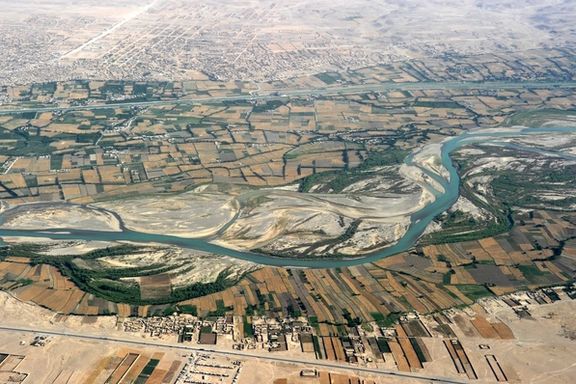
An Iranian parliamentary delegation has visited Kabul to address the water crisis in Sistan and Baluchestan stemming from the Taliban's Helmand River flow obstruction.

An Iranian parliamentary delegation has visited Kabul to address the water crisis in Sistan and Baluchestan stemming from the Taliban's Helmand River flow obstruction.
During their visit to Afghanistan, the delegation met with the Taliban's Foreign Minister, to address the problem of lack of proper water sharing from the river as well as additional security issues. The delegation said that Iran is willing to share its "various experiences" with the Taliban.
According to the Taliban's Ministry of Foreign Affairs, the seven-member delegation, led by Javad Karimi-Qoddousi, met with Amir Khan Muttaqi, the Acting Foreign Minister of the Afghan Interim Administration.
Hafiz Zia Ahmad, the spokesperson for Afghanistan's Ministry of Foreign Affairs, stated that in the meeting, both sides engaged in detailed discussions on topics including "security, combating narcotics, preventing smuggling, border protection, and trade."
Iran says that the Taliban have restricted water flow from the Helmand River to Iran's parched eastern regions, but this accusation is denied by the Taliban.
A particular point of contention between the Iranian officials and the Taliban surround the crossing of hundreds of thousands of Afghan refugees across the borders, and the increase in cultivation and transit of narcotics.
These differences led to clashes between Iranian border forces and the Taliban in a border outpost area in the Zabol border region in late May, resulting in casualties among Iranian border guards. However, Iran's Foreign Minister stated that the actions of the Taliban forces in this conflict were "unjustified."
Some members of the Iranian parliament, including Ahmad Naderi, a representative, had previously referred to the Taliban as "one of the authentic movements of the region with a Pashtun ethnic background" before their return to power, emphasizing that "collaboration with the Taliban could lead to the expansion of stability in Afghanistan and prevent the infiltration of groups like ISIS."
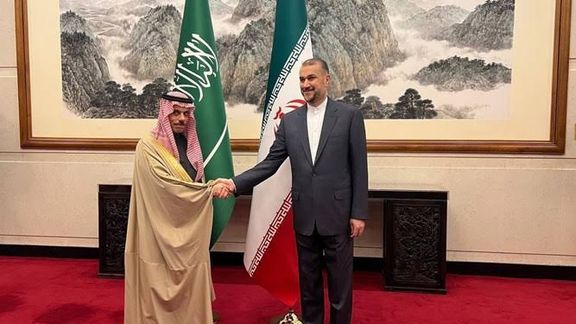
Efforts to address the hosting predicament surrounding the matches involving Iranian and Saudi Arabian football teams have been undertaken by the foreign ministers of both nations.
Since 2016, matches between representatives from Iran and Saudi Arabia in the Asian Champions League have been conducted on neutral territory, as mandated by the AFC executive board. Recent developments, however, have given rise to speculation about potential alterations to this arrangement.
According to reports, the Asian Football Confederation has initiated communication with the football federations of Iran and Saudi Arabia, with the aim of collaboratively designating a host location in a third country.
Mehdi Taj, the head of the Iran Football Federation, revealed during a sideline conversation at the Football Board Assembly that "Iran's Foreign Minister engaged in discussions with his Saudi Arabian counterpart to address the issue of holding matches between the two countries' representatives on neutral ground."
In contrast, Reza Darvish, the CEO of Persepolis football club, expressed his club's rejection of the directive received from the federation to select a host for Al-Nasr FC. He further communicated that Persepolis club is actively communicating with the football federation through correspondence, with the goal of retaining the privilege to host the match in Iran.
These negotiations occur against the backdrop of a significant diplomatic rapprochement facilitated by China in March. This initiative brought an end to years of animosity between Iran and Saudi Arabia, which had strained regional stability in Yemen, Syria, and Lebanon. On June 7, 2023, Iran formally reopened its embassy in Saudi Arabia, marking a pivotal step towards the restoration of diplomatic relations.
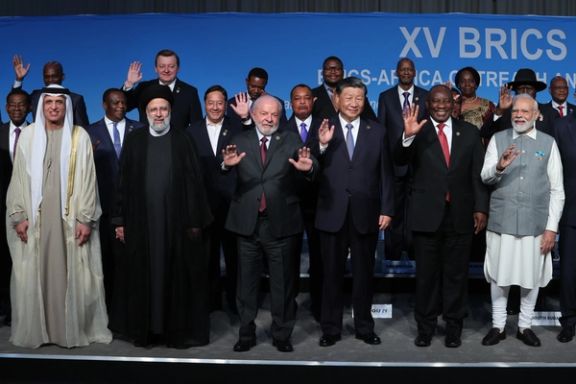
Amid Islamic Republic's international isolation, a few individuals with close ties to the regime appear optimistic about the country's recent inclusion in BRICS.
However, observers and experts in Tehran are starting to question the significance of this membership, particularly its unclear economic implications that Iranian officials have yet to elucidate.
There have been numerous social media posts about President Ebrahim Raisi's incoherent mumbling upon his return from South Africa at Tehran's airport. It can hardly be translated into any language including Persian, as it sounds like Greek to anyone, including Persians.
Nour News, a media outlet linked to Iran's Supreme Council of National Security, has offered this seemingly sophisticated explanation in a Threads post: "Six new members have been added to BRICS from the continents of America, Asia, and Africa. With these additions, 45 percent of the world's population and the owners of more than 30 percent of the world's gross product are now part of this alliance. This development signifies the breakdown of the old order that was rooted in geopolitics and the rise of a new order founded on geoeconomic cooperation."
The numbers, whatever practical implications they hold for Iran, are primarily driven by the substantial populations of India and China. However, the potential benefits of these figures for Iran remain uncertain, especially while the US sanctions are still in effect.

Kourosh Ahmadi, a former Iranian diplomat at the United Nations told Entekhab website in Tehran, " We cannot hold any hope of benefiting from the financial resources of BRICS as long as US sanctions remain in place," he emphasized. He went on to add, "Iranian officials must not be consumed by illusions regarding membership in the Shanghai Cooperation Organization and BRICS. Should they fall into such illusions, their membership could prove more detrimental than not being members at all"
Ahmadi pointed out that BRICS members decided to magnify the alliance's importance after several years of disputes particularly between India and China. India had concerns about the possible anti-Western tendency of BRICS. Ahmadi further noted that some of the pro-West and pro-East countries invited to the South Africa summit, were not interested in becoming members.
The interactions between the leaders of China and India were notably less than friendly. In contrast, while Saudi Arabia was granted membership, Riyadh expressed its intention to deliberate on the issue. Evidently, Riyadh does not share Iran's urgency to forge alignments with either China or the United States.
Ahmadi expressed doubt that, in the long run, expanding the number of its members would necessarily elevate the significance or influence of BRICS, and added, "I can hardly contain my laughter when I hear Iranian officials suggesting that BRICS will undermine the international dominance of the US dollar."
According to Entekhab it is doubtful that Iran could benefit from its BRICS membership without finalizing the negotiations with the United States and Europe over the 2015 nuclear deal (JCPOA). Ahmadi defined BRICS simply as "a forum for dialogue." He added that it even lacks a secretariat and a charter. Its founders defined it as "a way to promote dialogue and cooperation between the member states." He further added: "It is something like the Non-Aligned Movement."
Ahmadi reiterated that "Iranian officials should understand that without sorting out the nuclear issue through negotiations and without accepting the terms of the Financial Action Task Force (FATF), membership in organizations like BRICS or Shanghai cannot help Iran."
Regarding the Iranian government's propaganda, he said: "The government has every right to promote itself, but independent and knowledgeable individuals are also free to accept or dismiss it."
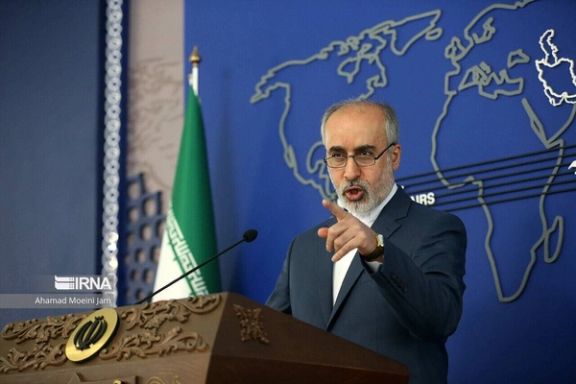
Iran called on the United States to clarify its association with Jamshid Sharmahd, an Iranian-German national sentenced to death in Iran after a State Department official met with his family.
Foreign Ministry Spokesperson Nasser Kanaani stated, "The United States government must respond to the Iranian government and people regarding the individual who is recognized and condemned in court for terrorism."
He added that Sharmahd, “responsible for a recognized terrorist group, has committed numerous acts of terrorism against Iran." He specifically alleged that Sharmahd had a role in planning and executing bombings in Shiraz, resulting in deaths and injuries.
Kanaani's remarks followed a meeting between US envoy for Iran, Abram Paley, and the family of Jamshid Sharmahd. Sharmahd, a German Iranian citizen abducted by Iranian agents in Dubai, in 2020, was sentenced to death in Iran in February. He was convicted of leading a pro-monarchist group linked to a deadly 2008 bombing.
Paley succeeded Rob Malley as US envoy for Iran, with Malley placed on unpaid leave due to security protocol violations. Sharmahd's family, including his son and daughter, Gazelle and Shayan, have been actively seeking US officials' attention through sit-in protests outside the State Department to advocate for their father's case.
A controversial deal exchanging five US citizens held hostage by Iran for the release of $6 billion in Iranian funds frozen in South Korea has sparked criticism, especially due to the exclusion of Sharamhd, who hold US permanent residency and another prisoner. Former hostages and analysts argue that the deal could embolden future hostage-taking incidents.
Sharmahd's health has deteriorated during his imprisonment, with human rights organizations expressing concern. He has been held in solitary confinement and denied fair legal proceedings. In February, Iran's judiciary handed down a death sentence.
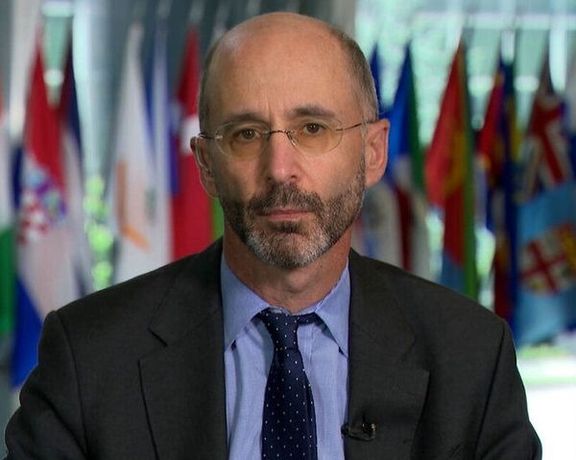
Regime affiliated Tehran Times has published a “sensitive but unclassified" US government memo allegedly showing three violations of US national security protocols by suspended Iran envoy, Rob Malley.
The document, purportedly from Erin Smart, Director of the State Department's Bureau of Diplomatic Security, Office of Personnel Security and Suitability, cites three reasons for Malley's suspension: “Personal Conduct,” “Handling of Protected Information,” and “Use of Information Technology.” The memorandum further underscores that Malley's “continued national security eligibility is not clearly consistent with the interests of national security."
While Iran International has yet to independently verify the document's authenticity, it has been informally corroborated by two congressional sources, who have described it as seemingly "authentic."
Iran International reached out to the State Department for confirmation on the authenticity of the leaked document; however, there was no immediate response.
Michael McCaul, chairman of the US House Foreign Affairs Committee, expressed concerns in July, hinting at a possible subpoena if the Biden administration remains reticent on the specifics of Malley's situation.
McCaul, relying on publicly available information, voiced serious apprehensions: "If he (Malley) has leaked very sensitive or classified information to our foreign adversaries like Iran or Russia, that's a very serious act that would fall under treason."
The State Department, citing privacy, has remained largely silent on the matter. However, the memo published by Tehran Times suggests that Malley might have been privy to the reasons behind his suspension, contrary to his earlier statements to the media.
"I have been informed that my security clearance is under review. I have not been provided any further information, but I expect the investigation to be resolved favorably and soon," Malley said in response to press inquiries at the time.
In the wake of the leaked document, Gabriel Noronha, a former State Department advisor on Iran, took to Twitter, suggesting, "The letter indicates Malley lied about not knowing why his clearance was pulled."
Richard Goldberg, a National Security Council official from the Trump era, remarked, "The Tehran Times knows more about Rob Malley than the New York Times. This is insane."
The controversy has also stirred debates among Iran analysts. Princeton University's decision to employ Malley at its School of Public and International Affairs has drawn criticism. Alireza Nader, an Iran analyst and a former senior researcher at the RAND Corporation questioned the institution's judgment, asking, "What in the world are Princeton and its SPIA dean Amaney Jamal thinking in hiring Malley? Does anyone want someone like this teaching students?"
Jason Brodsky, a policy director at the United Against Nuclear Iran, weighed in on the situation, expressing deep concern over the leak to a state-run newspaper of a nation often at odds with the US. "Can you imagine if this situation happened during the Trump administration? Somehow, I think there would be more press and congressional scrutiny. Just extraordinary. This is a newspaper of a hostile foreign power in possession of a seemingly authentic sensitive document."
Earlier this year, Iran International revealed Malley's interactions with Iran's UN ambassador, Amir Saeed Iravani, a former high-ranking member of Iran’s Supreme National Security Council. These interactions marked a pivotal diplomatic touchpoint, being the first direct US-Iranian official communication since the US's 2018 JCPOA withdrawal. The State Department, when questioned about these meetings, responded, "We have the means to deliver specific and firm messages to Iran when it is in America's interest to do so.”
Iran International first reported June 29 that Malley had been absent for a considerable time, his security clearance was suspended and he is under investigation related to his handling of classified documents. The Involvement of the Federal Bureau of Investigation was also reported, although until now no official details have been announced, except that Malley is on “unpaid leave.”

Iran’s media have reported that Ali Salehabadi, former governor of Iran's Central Bank, is set to assume the position of Iran's new ambassador to Qatar.
Salehabadi resigned as the governmental head of the Central Bank in December 2022 amid nationwide economic challenges. His new potential appointment appears timely as it coincides with the unfreezing of $6 billion of Iranian assets to Qatari banks and Iran’s hostage release of US citizens.
While no official confirmation has been released by either the Iranian government or Qatari authorities, this speculative appointment raises eyebrows due to Salehabadi's extensive financial background.
Salehabadi's tenure as the head of Iran's Central Bank was marked by a period of economic turbulence and uncertainty. Last year’s departure from the Central Bank was attributed to the complex economic problems that Iran faced during his term, including inflationary pressures and international sanctions.
The potential selection of Salehabadi as Iran's ambassador to Qatar, a role often filled by career diplomats, indicates a strategic shift in Iran's diplomatic approach. Experts speculate that this move might reflect Iran's intention to leverage Salehabadi's financial expertise to navigate the economic intricacies of the region, especially in light of the recent unfreezing of assets.
Iran’s deal with the US, which led to the release of the frozen funds, has been a point of contention within the international community. Critics argue that unfreezing these assets could inadvertently provide Iran with more resources to support its oppressive regime towards its citizens, while proponents suggest that it might pave the way for improved diplomatic relations.






